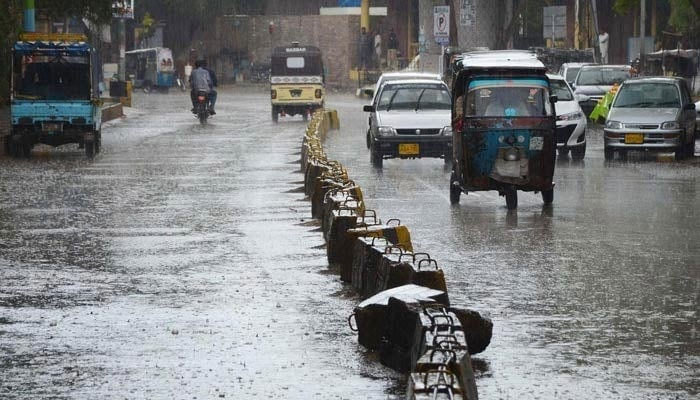Budget dialogue urges climate fund, end to fossil subsidies
KARACHI: Urgent climate and energy-related demands dominated a high-level budget dialogue held in Karachi, where experts and civil society groups called for the establishment of a ‘national climate adaptation fund’, restoration of tax incentives for renewable energy and phasing out fossil fuel subsidies in favour of greener alternatives.
Organised by the Sindh Just Energy Transition Alliance (SJETA) in collaboration with the Civil Society Support Programme (CSSP), the forum brought together government officials, academics, students, civil society members, and researchers to examine the federal and provincial budgets for 2025-26 through the lens of climate justice and energy transition.
The event concluded with a ‘policy ask document’ set to be submitted to the national and provincial assemblies. Among its top recommendations were aligning public spending with the Integrated Generation Capacity Expansion Plan (IGCEP 2025-34); gender-responsive budgeting; stronger funding for climate research; and a strategic shift from short-term mitigation to long-term climate adaptation.
Delivering the keynote address, Prof Dr Raza Ali Khan, former chairperson of the Economics and Management Sciences Department at NED University Karachi, urged the government to prioritise locally grounded renewable energy solutions and ensure effective use of climate funds. He said aligning fiscal policy with green goals is essential for long-term resilience.
Kashif Ali, executive director at Transparency International Pakistan, presented a critical review of existing budgets, revealing a sharp disconnect between climate ambitions and actual allocations. He noted that adaptation infrastructure, renewables, and local solutions remain underfunded, while fossil fuel subsidies still consume large fiscal space.
Representing the government, Engr Rajveer Singh, special assistant to the chief minister of Sindh on human rights, welcomed the forum’s recommendations. He highlighted provincial reforms, including the creation of SEPRA and STDC, and assured participants that the input would be shared with relevant ministries during ongoing budget deliberations.
Dr Fateh Mari, former vice chancellor of Sindh Agriculture University Tando Jam, called for dedicated research budgets to address climate challenges in agriculture, especially in water resource management and sustainable farming practices.
Presiding over the session, Prof Dr Mohammad Aslam Uqaili, former vice chancellor of Mehran University of Engineering and Technology (MUET), called for a structural overhaul of Pakistan’s budget framework.
He advocated community-led renewable energy models and highlighted Sindh’s untapped potential in solar and wind energy.Noor Bajeer, CEO of CSSP, who opened the session, stressed the need for inclusive and equitable fiscal policies that reflect the lived climate realities of vulnerable communities.
Iqbal Detho, chairperson of the Sindh Human Rights Commission, linked environmental protection to constitutional obligations under Article 9(A), stressing that both governance and timely budget execution are key to realising climate goals.
-
 'A Very Special Visitor' Meets Queen Camilla At Clarence House
'A Very Special Visitor' Meets Queen Camilla At Clarence House -
 Jodie Turner Smith Shares One Strict Rule She Follows As A Mom
Jodie Turner Smith Shares One Strict Rule She Follows As A Mom -
 Hailey Bieber Reveals KEY To Balancing Motherhood With Career
Hailey Bieber Reveals KEY To Balancing Motherhood With Career -
 Photo Of Jay-Z, Other Prominent Figures With Jeffrey Epstein Proven To Be Fake
Photo Of Jay-Z, Other Prominent Figures With Jeffrey Epstein Proven To Be Fake -
 Hillary Clinton's Munich Train Video Sparks Conspiracy Theories
Hillary Clinton's Munich Train Video Sparks Conspiracy Theories -
 Fans Slam Talk Show Host For 'cringe' Behavior In Chris Hemsworth Interview
Fans Slam Talk Show Host For 'cringe' Behavior In Chris Hemsworth Interview -
 Woman Jailed Over False 'crime In Space' Claim Against NASA Astronaut
Woman Jailed Over False 'crime In Space' Claim Against NASA Astronaut -
 James Van Der Beek’s Close Pal Reveals Family's Dire Need Of Donations
James Van Der Beek’s Close Pal Reveals Family's Dire Need Of Donations -
 Prince William And Harry's Cousins Attend 'Wuthering Heights' Event
Prince William And Harry's Cousins Attend 'Wuthering Heights' Event -
 Hailey Bieber Turns Heads Just Hours After Major Business Win
Hailey Bieber Turns Heads Just Hours After Major Business Win -
 King Charles' Andrew Decision Labelled 'long Overdue'
King Charles' Andrew Decision Labelled 'long Overdue' -
 Timothee Chalamet 'forever Indebted' To Fan Over Kind Gesture
Timothee Chalamet 'forever Indebted' To Fan Over Kind Gesture -
 Columbia University Sacks Staff Over Epstein Partner's ‘backdoor’ Admission
Columbia University Sacks Staff Over Epstein Partner's ‘backdoor’ Admission -
 Ozzy Osbourne's Family Struggles Behind Closed Doors
Ozzy Osbourne's Family Struggles Behind Closed Doors -
 Dua Lipa Claims Long-distance Relationship 'never Stops Being Hard'
Dua Lipa Claims Long-distance Relationship 'never Stops Being Hard' -
 BTS Moments Of Taylor Swift's 'Opalite' Music Video Unvieled: See Photos
BTS Moments Of Taylor Swift's 'Opalite' Music Video Unvieled: See Photos




